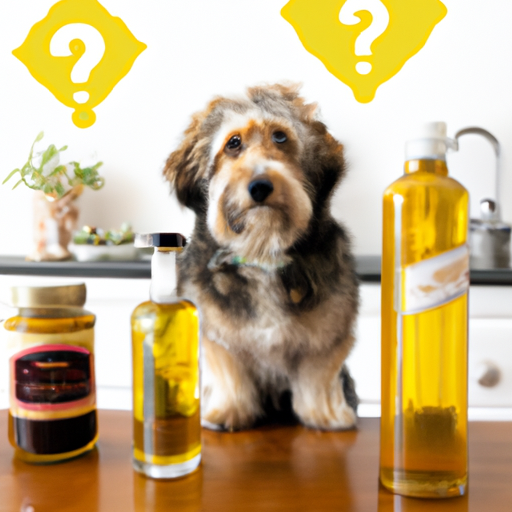As a caregiver for your furry friend, it’s important to be aware of the impact of various foods on their health. This is particularly true when it comes to cooking oils, which can sometimes be a source of confusion.
1. The Importance of Fats in a Dog’s Diet
Just like humans, dogs require a balanced diet to stay healthy. Fats, in particular, are essential for various bodily functions. They provide energy, help absorb certain vitamins, and play a crucial role in cell structure and function.
However, not all fats are created equal. Some can be beneficial, while others can be harmful if consumed in excess. When selecting a cooking oil for your dog, it’s important to consider the type of fat it contains.
2. Understanding Different Types of Fats
There are three main types of fats:
- Saturated fats, which are typically solid at room temperature and are found in animal products and tropical oils.
- Monounsaturated fats, which are usually liquid at room temperature and can be found in olive oil, avocado, and some nuts.
- Polyunsaturated fats, which remain liquid at room temperature and are found in fish, flaxseed, and walnuts.
| Type of Fat | Sources |
|---|---|
| Saturated | Animal products, tropical oils |
| Monounsaturated | Olive oil, avocado, nuts |
| Polyunsaturated | Fish, flaxseed, walnuts |
3. Safe Cooking Oils for Dogs
When it comes to cooking for your dog, some oils are safer and healthier than others. Here are a few options:
-
Olive Oil: Rich in monounsaturated fats, this oil is beneficial for heart health and can help improve your dog’s coat and skin.
-
Flaxseed Oil: This oil is a great source of Omega-3 fatty acids, which can help reduce inflammation and promote heart health.
-
Fish Oil: Another great source of Omega-3s, fish oil can help improve your dog’s immune system and reduce joint pain.
-
Coconut Oil: While high in saturated fats, coconut oil can be beneficial in small amounts. It can help improve skin conditions, promote weight loss, and improve digestion.
-
Sunflower Oil: This oil is rich in Vitamin E and Omega-6 fatty acids, which can help improve your dog’s skin and coat.
4. Oils to Avoid
While there are many safe options, there are also some oils that should be avoided. These include corn oil, soybean oil, and palm oil. These oils are high in Omega-6 fatty acids, which can lead to inflammation if consumed in excess.
5. How to Introduce New Oils to Your Dog’s Diet
When introducing new oils to your dog’s diet, it’s important to do so gradually. Start with a small amount and gradually increase it over time. This will allow your dog’s body to adjust and help prevent any potential digestive issues.
FAQ
Q: Can I give my dog the same cooking oil I use for myself?
A: It depends on the oil. While some oils are safe for both humans and dogs, others are not. Always do your research or consult with a vet before introducing a new oil to your dog’s diet.
Q: How much oil should I give my dog?
A: The amount of oil your dog needs can depend on their size, age, and overall health. As a general rule, it’s best to start with a small amount and adjust as needed.
Q: Are there any risks associated with giving my dog cooking oil?
A: While cooking oils can be beneficial, they can also cause issues if given in excess. Too much oil can lead to weight gain, pancreatitis, and other health problems. Always monitor your dog’s reaction to a new oil and consult with a vet if you have any concerns.
Q: Can I use cooking oil to improve my dog’s skin and coat?
A: Yes, certain oils like olive oil and sunflower oil can help improve your dog’s skin and coat. However, it’s important to use these oils in moderation to avoid any potential health issues.



